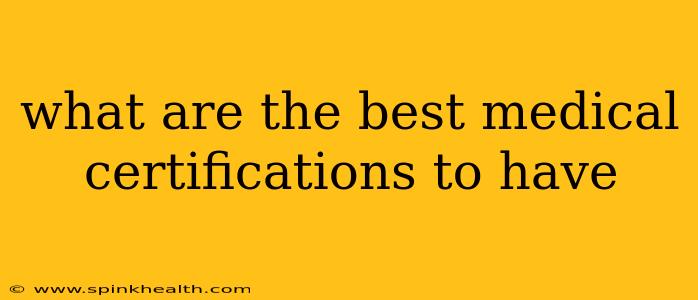The Best Medical Certifications to Have: A Journey Through Career Advancement
The world of medicine is vast and varied, offering a multitude of career paths, each with its own unique set of challenges and rewards. Choosing the right medical certification can be a pivotal decision, dramatically impacting your career trajectory and earning potential. But what are the best certifications? The answer, unfortunately, isn't a simple list. The "best" certification depends heavily on your current qualifications, career goals, and specialty. However, let's embark on a journey to explore some of the most highly sought-after and impactful certifications, addressing some common questions along the way.
What are the most in-demand medical certifications?
This question often tops the list for aspiring medical professionals. Demand fluctuates based on healthcare trends and technological advancements, but certain certifications consistently remain highly sought after. These include, but aren't limited to:
-
Board Certification in a Medical Specialty: For physicians, board certification is arguably the most crucial. It signifies completion of rigorous training and expertise in a specific area, like cardiology, oncology, or pediatrics. This significantly enhances credibility, opens doors to more advanced positions, and often leads to higher salaries.
-
Advanced Cardiac Life Support (ACLS): A cornerstone for emergency medical professionals, ACLS certification demonstrates proficiency in managing cardiac emergencies. It's a widely recognized and highly valued credential for nurses, paramedics, and other healthcare providers involved in critical care.
-
Basic Life Support (BLS): While seemingly less specialized than ACLS, BLS certification is fundamental for almost all healthcare workers. It's a prerequisite for many other advanced certifications and shows a foundational understanding of life-saving techniques.
-
Certified Medical Assistant (CMA): For those aspiring to work as medical assistants, earning a CMA certification demonstrates competence in clinical and administrative tasks, making them more attractive to employers.
-
Registered Nurse (RN): This is a cornerstone certification for nursing professionals. The RN license is required for most nursing jobs and signifies a commitment to safe and effective patient care. Numerous specialties within nursing also offer advanced certifications.
What medical certifications increase salary?
Many certifications, especially those indicating advanced skills and expertise, directly translate to higher earning potential. Board certifications in high-demand specialties, like interventional cardiology or neurosurgery, often command the highest salaries. Advanced certifications like Certified Nurse Midwife (CNM) or Certified Registered Nurse Anesthetist (CRNA) also open doors to higher-paying positions. However, salary is influenced by many factors, including experience, location, and employer.
Which medical certifications are easiest to obtain?
The ease of obtaining a certification varies significantly depending on the specific certification and the applicant's background. While some may require extensive study and examination, others might involve shorter courses and simpler assessments. BLS and some basic first-aid certifications are generally easier to obtain than advanced certifications requiring years of experience and in-depth medical knowledge.
What medical certifications are worth it?
The "worth" of a certification is entirely subjective and depends on individual goals. However, certifications that enhance career prospects, increase earning potential, and improve patient care are generally considered valuable investments. Choosing a certification that aligns with your career aspirations and contributes to professional growth is crucial.
How much do medical certifications cost?
The cost of medical certifications varies greatly depending on the type of certification, the provider, and the required training. Some basic certifications may cost a few hundred dollars, while more specialized certifications might run into thousands. It's essential to research the specific cost before pursuing any certification.
In conclusion, the journey to finding the "best" medical certification is a personal one. Consider your strengths, passions, and career aspirations. Research different certifications, compare their costs and benefits, and choose the path that best suits your individual journey in the dynamic world of medicine. Remember to always verify the legitimacy and reputation of the certification provider before enrolling in any program.

